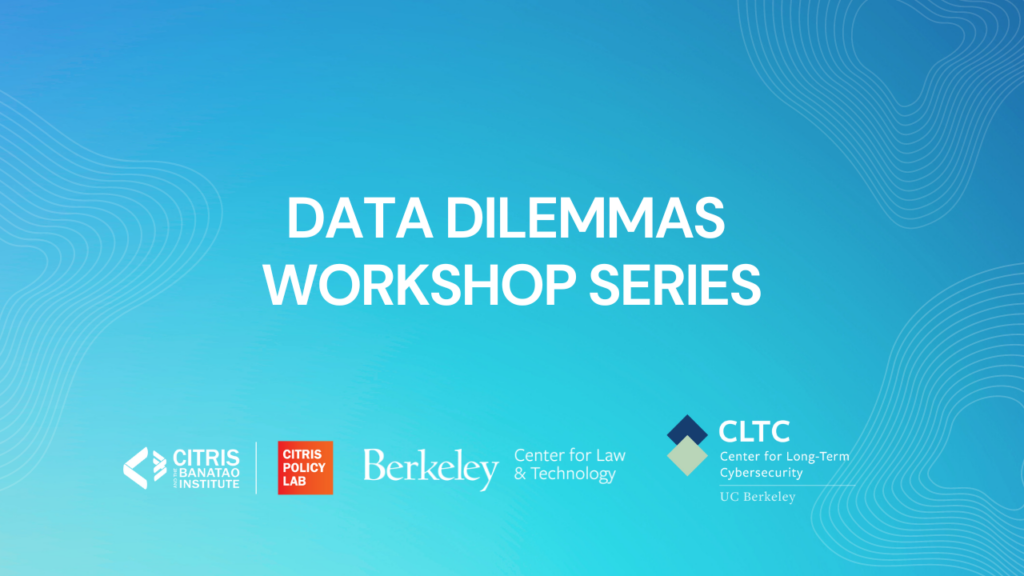
Events

Data Scraping & Fair Breach
When: Fri., Dec. 1, 2023 | 9:00 – 12:00 pm PT (virtual)
Third-party scraping of platform data for research and commercial purposes is increasingly raising ethical and legal uncertainties. In 2021, researchers at the NYU Ad Observatory had their Facebook accounts blocked by Meta for scraping political ads provided by willing research participants. The following year, the Ninth Circuit ruled that hiQ Labs had violated LinkedIn’s terms of service by scraping public profiles, yet prohibited LinkedIn from selectively blocking potential competitors from accessing publicly available data via its platform on grounds that doing so constitutes “unfair competition under California Law.” In 2023, Elon Musk’s X Corp filed a lawsuit against four “John Does” in Texas for “unlawfully scraping data” and simultaneously implemented technical barriers on the platform to further mitigate third-party scraping.
Participants will examine the concept of fair breach for research and commercial scraping activities in relation to platforms’ terms of service, data protection laws, and intellectual property rights. The workshop will also facilitate discussions on appropriate definitions for researcher, public interest research, and allowable commercial purposes.
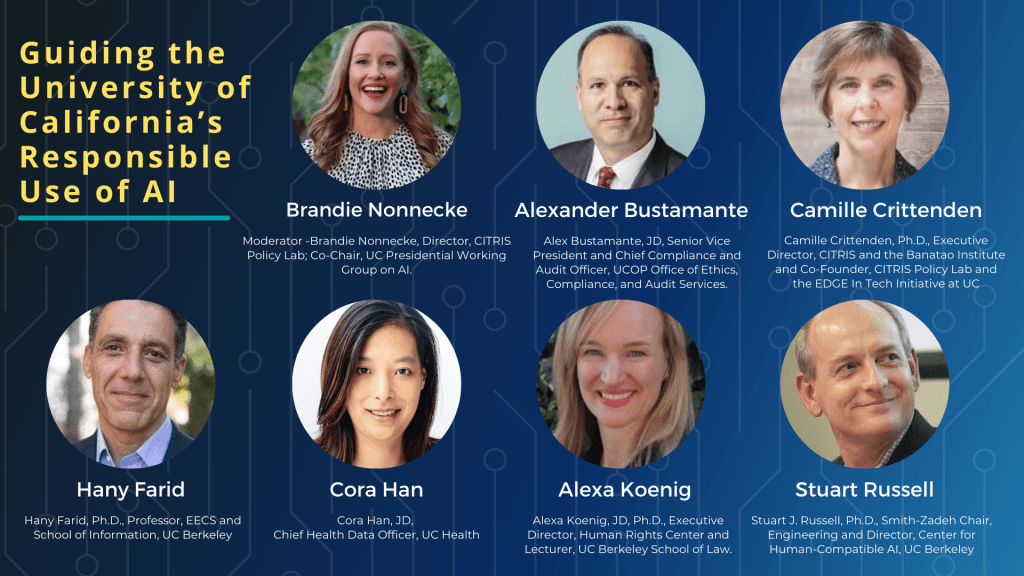
Guiding the University of California’s Responsible Use of AI
When: Wed., March 2, 2022 | 12:00 – 1:00 pm PT
The University of California (UC) is increasingly turning to AI-enabled tools as a means to improve its operations. While AI can bring significant benefits, ill-conceived deployments risk imposing disproportionate harms. Launched by UC President Michael Drake and former UC President Janet Napolitano, the UC Presidential Working Group on AI developed a set of overarching principles and recommendations for UC’s current and future use of AI. This panel will discuss its final report and next steps to guide UC’s responsible AI strategy.
Panel moderated by: Brandie Nonnecke, PhD is Director, CITRIS Policy Lab; Co-Chair, UC Presidential Working Group on AI. @BNonnecke @CITRISPolicyLab @citrisnews
Panelists:
– Alexander Bustamante, JD, is Senior Vice President and Chief Compliance and Audit Officer in the UCOP Office of Ethics, Compliance, and Audit Services.
– Camille Crittenden, PhD, is the Executive Director of CITRIS and the Banatao Institute and Co-Founder of the CITRIS Policy Lab and the EDGE (Expanding Diversity and Gender Equity) in Tech Initiative at UC.
– Hany Farid, PhD., is a professor at the University of California, Berkeley with a joint appointment in electrical engineering & computer sciences and the School of Information.
– Cora Han, JD, is the Chief Health Data Officer at UC Health.
– Alexa Koenig, JD, PhD, is the Executive Director of the Human Rights Center (winner of the 2015 MacArthur Award for Creative and Effective Institutions) and a lecturer at UC Berkeley School of Law.
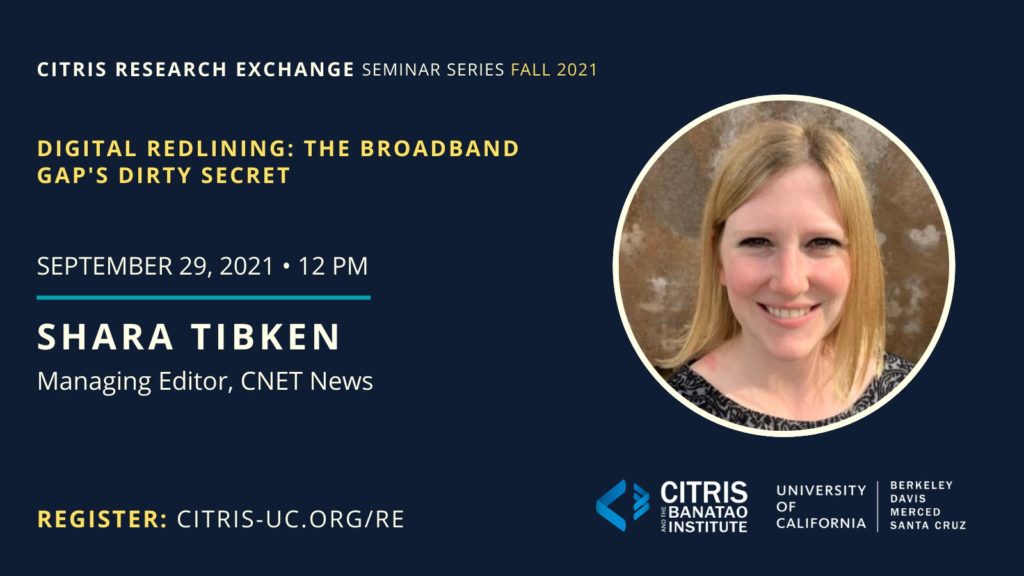
Digital Redlining: The Broadband Gap’s Dirty Secret
When: Wed., Sept. 29, 2021 | 12:00 – 1:00 pm PT
Communities that couldn’t get mortgage loans in the 1940s are the same areas without fast home internet service today. Big broadband providers, when deciding where to invest the money to upgrade their networks, often focus on wealthier parts of cities and shun low-income communities. Fiber connections are expensive, and ISPs are hesitant to expand unless they expect a return on their investment. As a result, poorer communities often have no internet or are stuck with slow, legacy networks that can’t meet today’s demands — even though they usually pay as much as their wealthier neighbors who have gigabit fiber connections.
About the Speaker
Shara Tibken is managing editor at CNET News in San Francisco. In her role, she oversees a team of reporters, as well as covers the mobile device industry and the digital divide. Before joining CNET, Shara wrote about technology and the stock market for Dow Jones and The Wall Street Journal in New York. She grew up on a farm in rural Iowa and graduated from Simpson College in Indianola, Iowa, in 2007. The poor internet connectivity in her hometown inspired Shara’s interest in the broadband gap.

Women in Law, Policy, and Government
When: Wed., April 28, 2021 | 10:00 – 11:00 am PT
Panelists
Ann Cleaveland, Executive Director of the Center for Cybersecurity at the School of Information
Catherine Fisk, Professor of Labor Law at Berkeley Law
Janet Napolitano, former UC President, former Secretary of Homeland Security, and Professor of Public Policy at UC Berkeley
Moderator
Brandie Nonnecke, Director, CITRIS Policy Lab
About the Panel
In this one-hour webinar presented by the Women in Business Law Initiative at Berkeley Law, a panel of distinguished leaders will discuss policies and practices affecting women’s fair representation in the fields of law, policy, and government.
This webinar is co-sponsored by the CITRIS Policy Lab and the Center for Long-Term Cybersecurity.

The Charisma Machine: The Life, Death, and Legacy of One Laptop per Child with Morgan Ames
When: Wed., Feb. 24, 2021 | 12:00 – 1:00 pm PT
Ames will discuss her book The Charisma Machine, named Best Information Science Book of 2020, to explore the life and legacy of the One Laptop per Child project and explain why—despite its failures—the same utopian visions that inspired OLPC still motivate other projects trying to use technology to “disrupt.” Announced in 2005 by MIT Media Lab cofounder Nicholas Negroponte, One Laptop per Child promised to transform the lives of children across the Global South. Even as the project fell short in many ways, it remained charismatic to many who were enchanted by its claims of a global transformation. Drawing on archival research and an ethnographic study of a model OLPC project, Ames offers a cautionary tale about the allure of technology hype and the problems that result when utopian dreams drive technology development.
About the Speaker
Morgan Ames is an Assistant Adjunct Professor at the School of Information, and the Associate Director of Research at the Center for Science, Technology, Medicine and Society at UC Berkeley. Ames researches the ideological origins of inequality in the technology world, with a focus on utopianism, childhood, and learning. The questions that drive her current projects concern the ways in which young people construct their identities with computers, and how computers (and the technology design practices that produced them) shape the identities they construct. Morgan is an assistant adjunct professor in the School of Information at the University of California, Berkeley, where she teaches in Data Science and administers the Designated Emphasis in Science and Technology Studies in affiliation with the Center for Science, Technology, Medicine and Society.
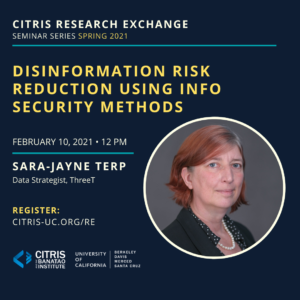
Disinformation Risk Reduction using Information Security Methods with Sara-Jayne Terp
When: Wed., Feb. 10, 2021 | 12:00 – 1:00 pm PT
In just 4 years, disinformation has evolved to the point where it is now being used by a spectrum of actors, from activists to nation-states, and is difficult to counter with fixed methods. CogSec Collab, and its predecessor MisinfoSec, designs and tests real-time response to disinformation incidents. The Collab applies information security principles to defenses against disinformation, builds processes and tools for this, and runs or mentors response teams including the CTI league’s covid19-focussed disinformation team. This talk covers our recent research on disinformation risk management and Cognitive Security Operations Centers.
About the Speaker
Sara-Jayne Terp is a Data Strategist at ThreeT. SJ works on social data problems, including community-based ways to track, counter, and mitigate disinformation. She leads the CogSecCollab disinformation community, runs the CTI League’s disinformation team, and is a senior fellow at the Atlantic Council, where she writes about human issues as systems. Her degrees are in AI and neural networks.

The Alignment Problem: Machine Learning and Human Values with Brian Christian
When: Wed., Jan. 27, 2021 | 12:00 – 1:00 pm PT
With the incredible growth of machine learning over recent years has come an increasing concern about whether ML systems’ objectives truly capture their human designers’ intent: the so-called “alignment problem.” Over the last five years, these questions of both ethics and safety have moved from the margins of the field to become arguably its most central concerns. The result is something of a movement: a vibrant, multifaceted, interdisciplinary effort to address the alignment problem head-on, which is producing some of the most exciting research happening today. Brian Christian, Visiting Scholar at CITRIS and author of the acclaimed bestsellers The Most Human Human and Algorithms to Live By, will survey this landscape of recent progress and the frontier of open questions that remain.
About the Speaker
Brian Christian is an author and Visiting Scholar at UC Berkeley. Brian Christian is the author of the acclaimed bestsellers The Most Human Human and Algorithms to Live By (with Tom Griffiths), which have been translated into nineteen languages. A Visiting Scholar at the CITRIS Policy Lab, the Scientific Communicator in Residence at the Simons Institute, and an Affiliate of the Center for Human-Compatible Artificial Intelligence, he lives in San Francisco.

The Inclusive Workforce: Strategies to Enhance the Future of Public Sector Work
Elana Zeide, PULSE Fellow in Artificial Intelligence, Law & Policy, UCLA
Saurabh Sanghvi, Associate Partner, McKinsey & Company
Scott Mauvais, Microsoft, Director of AI and Global Partnerships, Microsoft Philanthropies
Brandie Nonnecke, Director, CITRIS Policy Lab
About the Panel
While a strong body of research has emerged on the ways emerging technologies, especially artificial intelligence (AI), will disrupt private sector work, less attention has been given to understanding these effects on public sector work and workers. Yet these technologies are increasingly being deployed in the public sector to address growing workload demands, shortage of workers, and budget constraints.
In collaboration with Microsoft, the Center for Information Technology Research in the Interest of Society (CITRIS) and the Banatao Institute will host a CITRIS Research Exchange panel to explore the effects of emerging technologies, like machine learning-powered decision systems and robotic process automation, within three public service sectors: education, social services, and law enforcement. Panelists will explore priority strategies to better ensure implementation of emerging technologies not only contribute to greater efficiency and effectiveness, but also equity. The CITRIS Policy Lab will also release its white paper on the effects of emerging technologies on public sector work and priority technology and policy recommendations.

The New Jim Code? Race, Carceral Technoscience, and Liberatory Imagination in Everyday Life
When: Thurs., Oct. 17, 2019 |
3:00 – 4:00 pm Book Signing & Reception, Kvamme Atrium, Sutardja Dai Hall, UC Berkeley
4:00 – 5:30 pm Presentation, Banatao Auditorium, Sutardja Dai Hall, UC Berkeley
From everyday apps to complex algorithms, technology has the potential to hide, speed, and even deepen discrimination, while appearing neutral and even benevolent when compared to racist practices of a previous era. In this talk, Dr. Ruha Benjamin, Associate Professor of African American Studies at Princeton University, presents the concept of the “New Jim Code” to explore a range of discriminatory designs that encode inequity.
About the Speaker
Ruha Benjamin is an Associate Professor of African American Studies at Princeton University, founder of the JUST DATA Lab, and author of Race After Technology: Abolitionist Tools for the New Jim Code (Polity 2019) and editor of Captivating Technology: Reimagining Race, Carceral Technoscience, and Liberatory Imagination in Everyday Life (Duke 2019) among many other publications. Dr. Benjamin’s work investigates the social dimensions of science, medicine, and technology with a focus on the relationship between innovation and inequity, health and justice, knowledge and power. She is the recipient of numerous awards and fellowships including from the American Council of Learned Societies, National Science Foundation, Institute for Advanced Study and, in 2017, she received the President’s Award for Distinguished Teaching at Princeton.
Sponsors
This event is sponsored by CSTMS.
Additional sponsorship comes from: The CITRIS Policy Lab • Haas Institute for a Fair and Inclusive Society

The Future of 5G for California: Ensuring Equitable Access
When: Wed., Oct. 2, 2019 | 12:00 – 1:00 pm
Where: Banatao Auditorium, Sutardja Dai Hall, UC Berkeley
Panelists
Ernesto Falcon, Legislative Counsel, Electronic Frontier Foundation
Heba Gamal, Senior Director, Market Expansion & Growth, Common
Shireen Santosham, Chief Innovation Officer, San Jose Mayor’s Office of Technology & Innovation
Brandie Nonnecke, Director, CITRIS Policy Lab
About the Panel
5G wireless networks hold great potential, enabling unprecedented advancements in linking robots, cars, and other sensor-enabled technologies and infrastructure to revolutionize cities. While the future of smart cities may bring gains in sustainability, mobility, and economic opportunity, ensuring these benefits are felt by all community members remains a significant challenge. Our panel explores emerging trends in 5G and provides recommended strategies to better ensure equitable deployments.
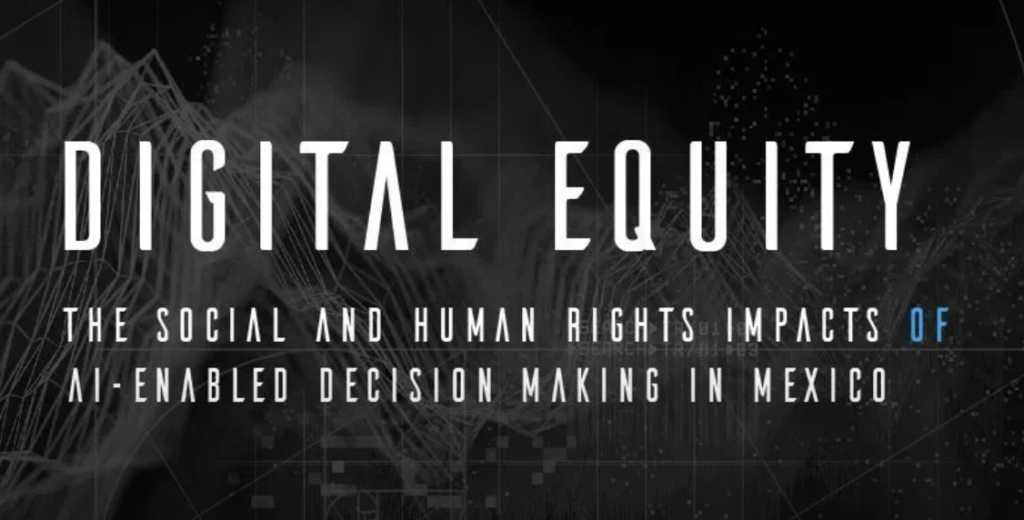
Digital Equity: The Social and Human Rights Impacts of AI in Mexico
–
Equidad Digital: Los efectos de la inteligencia artificial en los ámbitos sociales y de los derechos humanos en México
When: Thurs., August 29, 2019 | 9:00 – 6:00 pm
Where: Tecnologico de Monterrey, Campus Estado de México, Mexico City
Website: wip.mx/de
Artificial intelligence (AI) holds great potential to benefit society, enabling greater efficiency, equity, and reach. But, utilization of biased training data and ill-considered algorithms can undermine social gains by perpetuating and reinforcing social injustices. While AI-enabled systems have been shown to have these negative effects, it is important to also consider how AI and intelligent tools can be applied to power some of the most innovative solutions to society’s most pressing challenges — from democratic engagement to humanitarian aid and digital inclusion.
This workshop brings together leading practitioners and scholars to discuss the social and human rights impacts of AI-enabled systems in the Mexico-U.S. context and to support the development of interdisciplinary research and capacity building.
This material is based upon work supported by a grant from the University of California Institute for Mexico and the United States (UC MEXUS) and the Consejo Nacional de Ciencia y Tecnologia de Mexico (CONACYT).

AI, Human Dignity & Inclusive Societies: Protecting Vulnerable Populations & Inclusion of Minority Groups
United Nations ITU AI for Good Global Summit
When: May 28-31, 2019
Where: Conference Centre Geneva (CICG), Geneva, Switzerland
Hosted in collaboration with UNICEF and the Global Digital Policy Incubator at Stanford, the CITRIS Policy Lab will convene a 90-minute session during the UN ITU AI for Good Global Summit on May 29 from 11:00 – 12:30 pm. Building on SDG 10 (reduce inequality within and among countries) and SDG 5 (achieve gender equality and empower all women and girls) this session focuses on equal protection, non-discrimination, and gender and racial diversity with respect to design and deployment of AI for public and private applications.

The Future of 5G for California: A Briefing for the California Legislature
When: Fri., May 10, 2019 | 10:15 – 12:00 pm
Where: California State Capitol
On Fri., May 10, the Silicon Valley Leadership Group hosted a briefing for the California Legislature on the future of 5G in California. Brandie Nonnecke, Director of the CITRIS Policy Lab at UC Berkeley, was joined by experts from Verizon, Nokia, the Electronic Frontier Foundation, and the City of San Jose to discuss new strategies for 5G deployment and the social and economic impacts of 5G for the State of California.
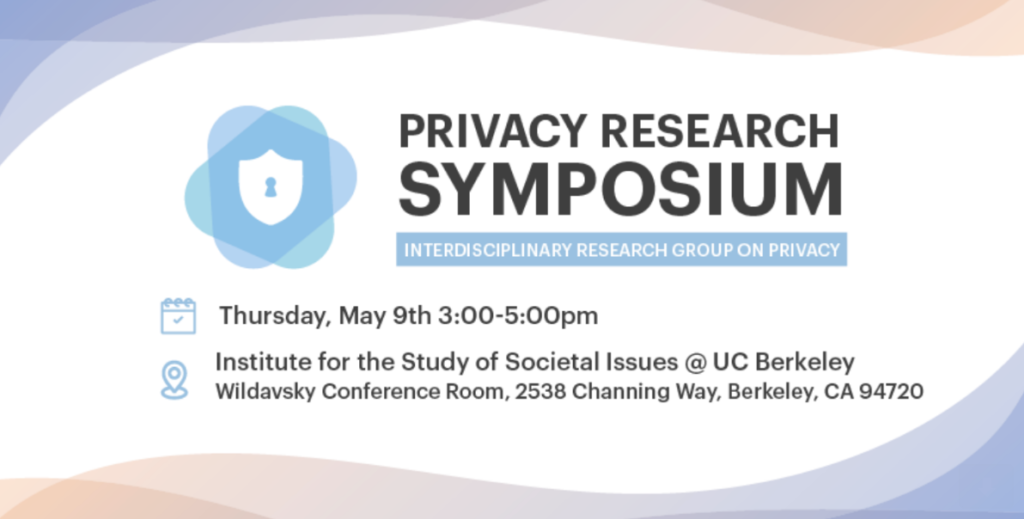
6th Bi-Annual Privacy Research Symposium
When: Thurs., May 9, 2019 | 3:00-5:00 pm
Where: UC Berkeley Institute for the Study of Societal Issues, Wildavsky Conference Room, 2538 Channing Way
Registration: 6th Bi-Annual Privacy Research Symposium
Questions? Please contact Naniette Coleman (nhcoleman@berkeley.edu) with any questions or concerns.
The Interdisciplinary Research Group on Privacy (IRGP) will be hosting its 6th Bi-Annual Privacy Research Symposium on May 9th from 3 – 5 pm. The symposium provides a venue for undergraduate and graduate student affiliates to present research and projects on topics relating to privacy, surveillance, and cybersecurity. This semester, students participated in research projects on a range of topics, including airport privacy, state privacy laws, blockchain, search engine privacy, privacy in higher education, and post-mortem privacy. Come join us as we celebrate and encourage these burgeoning scholars and learn about their work this semester!
Students will be presenting their research projects in an electronic poster session. Attendees are free to come and go any time during the symposium. Food and beverages will be served!
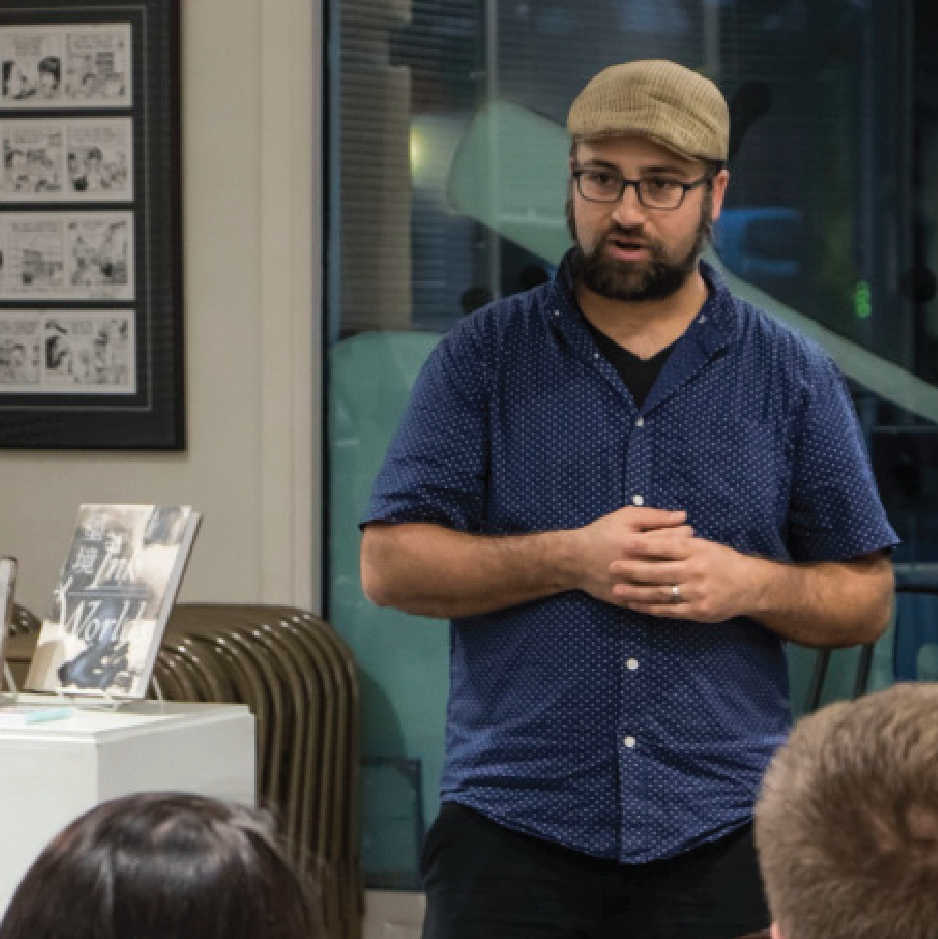
50 Years of Surveillance Law in America
When: Wed., April 3 | 12:00 – 1:00 pm
Where: 310 Banatao Auditorium, Sutardja Dai Hall, UC Berkeley
Registration: tiny.cc/FarivarCITRISRE
Cyrus [suh-ROOS] Farivar is an Investigative Tech Reporter at NBC News, and is also an author and radio producer.
His second book, Habeas Data, about the legal cases over the last 50 years that have had an outsized impact on surveillance and privacy law in America, is due out May 8, 2018 from Melville House.
About the Series
Launched in 2008, the CITRIS Research Exchange delivers fresh perspectives on information technology and society from distinguished academic, industry, and civic leaders. Join us this spring to celebrate 10 years of innovative ideas and dialogue.
Learn more about CITRIS and the Banatao Institute at the University of California.

Algorithms of Oppression: How Search Engines Reinforce Racism with Safiya Umoja Noble
When: Wed., March 20, 2019 | 5:00 – 6:30 pm
Where: 310 Banatao Auditorium, Sutardja Dai Hall, UC Berkeley
Registration opens at 10 am on March 10: tiny.cc/SafiyaNobleMarch20
Co-hosted by the CITRIS Policy Lab and the Berkeley Center for New Media (BCNM), Safiya Umoja Noble will present insights from her recent best-selling book Algorithms of Oppression where she challenges the idea that search engines like Google offer an equal playing field for all forms of ideas, identities, and activities. Data discrimination is a real social problem. Noble argues that the combination of private interests in promoting certain sites, along with the monopoly status of a relatively small number of Internet search engines, leads to a biased set of search algorithms that privilege whiteness and discriminate against people of color, specifically women of color- and contributes to our understanding of how racism is created, maintained, and disseminated in the 21st century.
More about the BCNM History and Theory of New Media Lecture Series
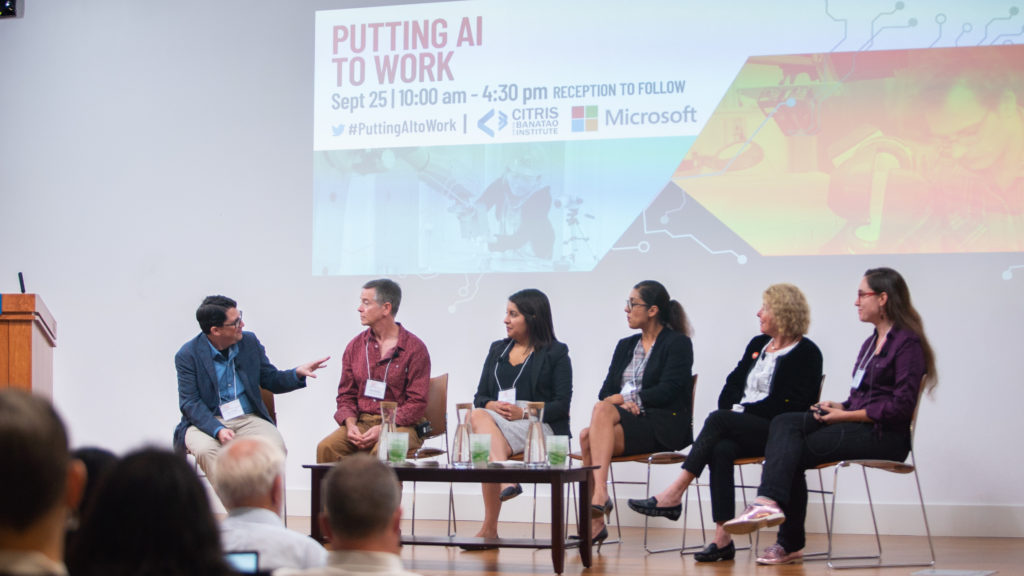
Putting AI to Work: Technology and Policy for Enabling the Workforce of the Future
When: Sept. 25, 2018
Where: 310 Banatao Auditorium, Sutardja Dai Hall, UC Berkeley
Co-hosted by CITRIS and the Banatao Institute and Microsoft, “Putting AI to Work” brought together leading scholars, practitioners, industry representatives, and community organizations to discuss the pace and extent of the effects of AI on the future of work in relation to aging and disability. Panelists considered a range of issues regarding workforce, technology and design trends for target populations, and policy questions for a new era of automated and adaptive workplaces. Jennifer Granholm, Former Governor of the state of Michigan, and Joshua Miele, Associate Director of Technology Research and Development at Smith-Kettlewell Eye Research Institute, provided keynote remarks.
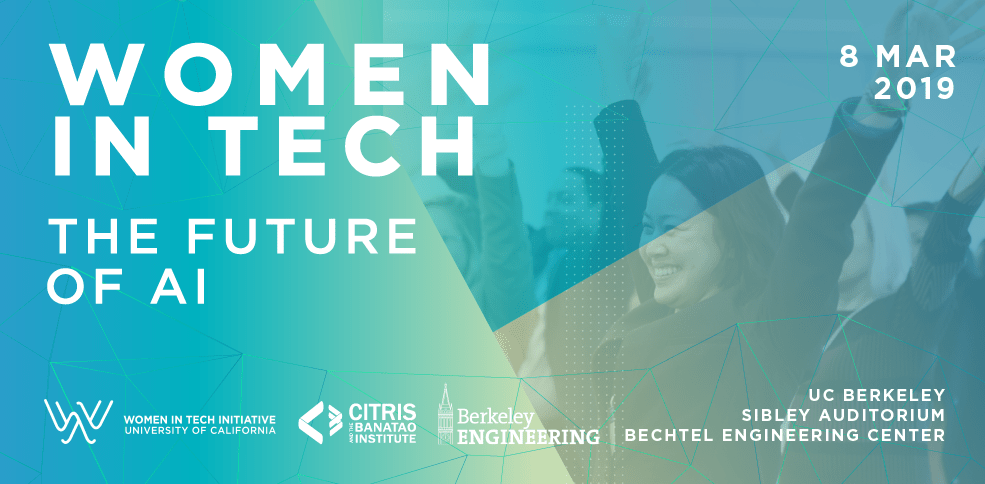
Women in Tech: The Future of AI
When: Fri., March 8, 2019 | 11:00am – 5:00pm
Where: Sibley Auditorium, Bechtel Engineering UC Berkeley
Registration: womenintech19.eventbrite.com
Hosted by the Women in Technology Initiative at the University of California, this year’s symposium will highlight the experiences of women in AI and explore our collective future with representatives from established companies, startups, academia, and the public sector.
The event will also feature the Women in Tech Initiative Athena Awards recognizing those who have championed the advancement of women in technology. This year’s winners were recently announced.
The symposium is open to everyone, encouraging a broader audience to join the conversation. Attendees will have the opportunity to share experiences, establish new connections, and collectively champion the advancement of women in technology.
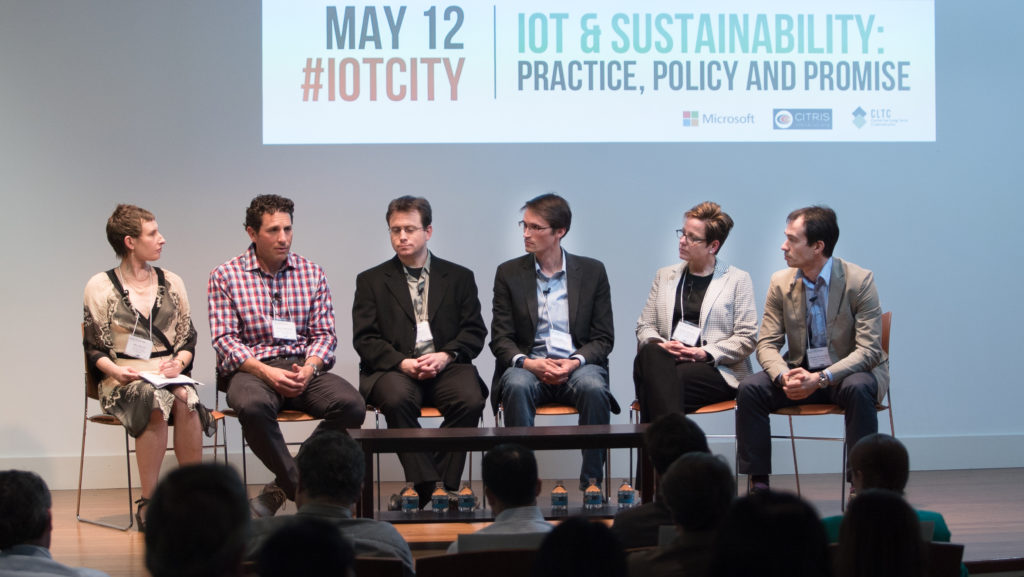
IoT & Sustainability: Practice, Policy And Promise Public Symposium
When: May 12, 2016
Where: 310 Banatao Auditorium, Sutardja Dai Hall, UC Berkeley
Co-hosted by CITRIS and the Banatao Institute and Microsoft, “IoT & Sustainability: Practice, Policy and Promise” brought together leaders from academia, industry, and government to discuss the promise of the Internet of Things (IoT) for managing energy, water, and transportation in the urban environment. The symposium highlighted emerging technologies for smarter cities; raised questions regarding privacy and security; and identified issues pertaining to data collection, storage, and interoperability. Tom Siebel, Chairman and CEO of C3IoT, and Melanie Nutter, Principal at Nutter Consulting, provided keynote remarks.
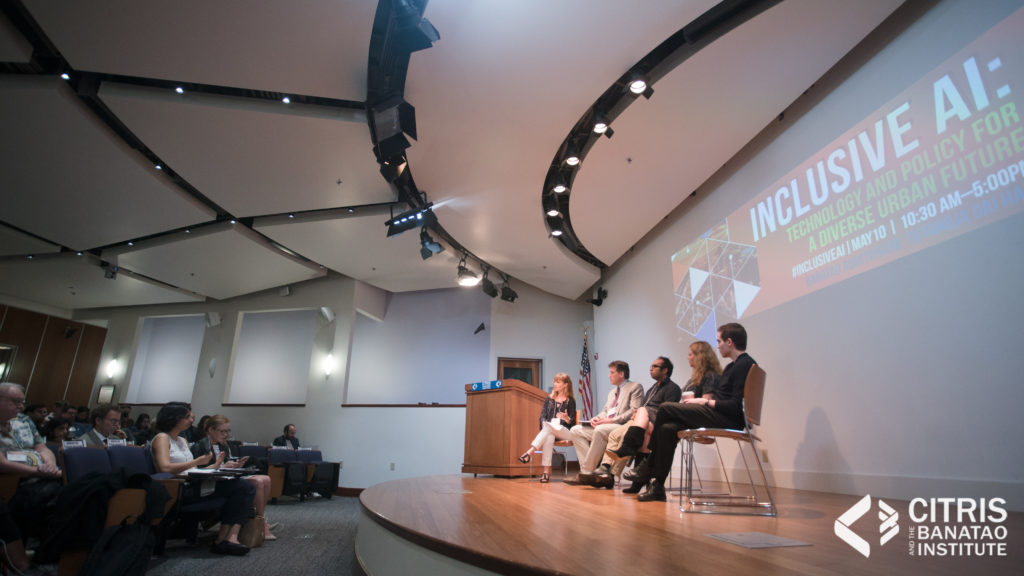
Inclusive AI: Technology and Policy for a Diverse Urban Future
When: May 10, 2017
Where: 310 Banatao Auditorium, Sutardja Dai Hall, UC Berkeley
Co-hosted by CITRIS and the Banatao Institute and Microsoft, “Inclusive AI: Technology and Policy for a Diverse Urban Future” brought together leaders from academia, industry, and government to explore the benefits and risks of AI on cultural, social, political, and economic inclusion in the urban context. Fei-Fei Li, Professor and Director of the Stanford AI Lab; Brian Christian, Author of The Most Human Human; and Ryan Calo, Professor and Director of the University of Washington Tech Policy Lab, provided keynote remarks.


